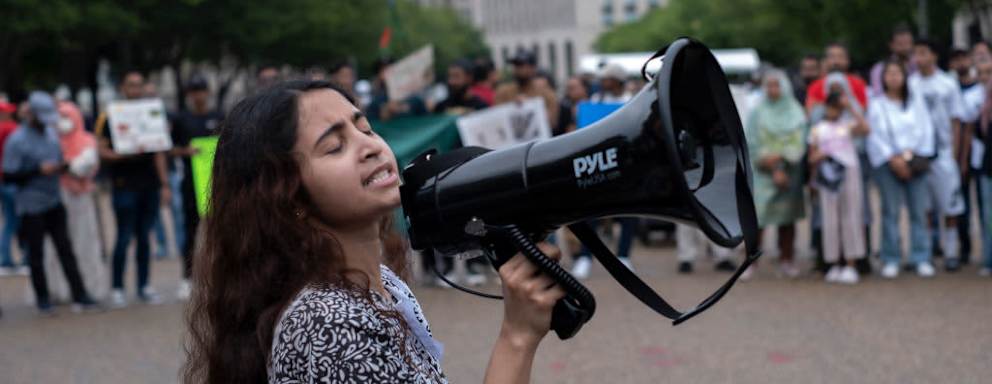Growing Number of College Students Insecure About Free Speech
 Credit: Image Credit: Probal Rashid / Contributor / LightRocket / Getty Images
Credit: Image Credit: Probal Rashid / Contributor / LightRocket / Getty Images- New survey research says students feel less secure about free speech than they did eight years ago.
- Most say speech can be as damaging as physical violence.
- Opinions vary based on gender, race, and political party affiliation.
- Students believe in the right to free speech but find the exercise of that right increasingly challenged.
A new report says only 43% of college students believe their freedom of speech is secure. When the same survey was conducted in 2016, that figure was 73%.
Seven out of 10 of today’s students also say speech can be as damaging as physical violence.
Bear in mind this survey was conducted before the spring 2024 campus protests and free speech debates stemming from the Israel-Hamas war.
Just how poorly do American campuses protect free speech?
Faith in Free Speech Declining on Campus
The study, “College Student Views on Free Expression and Campus Speech 2024,” charts changes in student attitudes on free speech since 2016 when the Knight Foundation began conducting this survey.
In conjunction with Ipsos, a market research company that conducted the survey in March 2024, this Knight Free Expression Research Series report presents the findings of a poll involving 1,678 current college students between the ages of 18 and 24 attending both two-year and four-year institutions.
Its aim is to continue the investigation into the complexities of free expression on campus
and to highlight the evolving views of students.
Since the project began eight years ago, student opinions on free speech protections have largely deteriorated. Most startling among these findings is that the perception that free speech rights are secure
has dropped by 30 percentage points.
Whether this perception pertains to free speech on campus or in general remains unclear. The question asks, To what extent do you think each of the following rights is secure or threatened in the country today?
The percentage refers to those who feel free speech rights are secure
or very secure.
The report frames its findings in the context of campus speech, however, and given that students are most likely to consider their responses in light of their current circumstances, it’s logical to accept this interpretation.
A major theme of the report is that students value free speech, with certain limitations, but find their rights frequently compromised.
Students want to be exposed to a wide range of viewpoints,
the report claims, though tension persists between promoting free expression and protecting students from hateful or threatening speech.
At the same time, while 2 in 3 students say self-censorship affects educational quality, the same number say they’ve censored their own speech in class, particularly around topics such as gender, diversity, and religion.
The percentage of students who feel uncomfortable about such speech has almost doubled, growing from 25% in 2017 to 44% today.
Interestingly, even though students equate harmful speech with physical violence, 46% believe hate speech should be protected, up from 35% in 2017. And only one-third believe universities should enforce speech codes, down from 49% in 2017.
Attitudes Vary Based on Race, Gender, Political Affiliation
Perceptions of free speech and its limitations differ according to race, gender, and party loyalty.
With respect to race, white students are less likely than Black or Hispanic students to impose limitations on free speech. Black students are also twice as likely as white students (20% to 10%) to report feeling unsafe on campus based on statements about race or ethnicity.
Sixteen percent of Hispanic students reported feeling unsafe.
What’s more, while 66% of white students say speech can be as damaging as physical violence, 81% of Black students and 74% of Hispanic students believe this to be true.
Along gender lines, almost twice as many female students (19%) as male students (10%) say they’ve felt unsafe on campus because of someone’s speech. Just over half (51%) of female students also say they’ve been uncomfortable in class or elsewhere on campus because of something somebody said. Only 35% of male students report a similar feeling.
On the question of speech approximating physical violence, 74% of females believe this to be the case, while only 64% of males do.
Overall, perceptions about the security of free speech have dropped among Democrats, Republicans, and independents, yet the percentages differ.
Among Democrats, 51% say free speech is secure, down from 63% five years ago. Only 34% of today’s Republicans believe this, while five years ago, 52% did.
And among independents, those figures are 42% and 59%, respectively.
Democrats are more likely than Republicans or independents to favor protecting students from offensive speech, and roughly 2 in 3 Republican students believe their campus prevents people from saying things others might find offensive.
Campus Climate Stifles Speech
When it comes to sharing opinions, students say the setting matters considerably. Almost 9 in 10 (88%) say they’re comfortable sharing opinions with friends, but only 60% feel this way while in class.
Curiously, social media (55%) ranked lowest in this respect.
Most students (60%) report that the climate
at their schools prevents people from engaging in speech that others might find objectionable. That’s up from 54% in 2016.
Yet a majority of students trust the faculty (68%) and administration (57%).
And a growing number of students believe colleges should protect
students from offensive speech. Three years ago, 22% agreed with this sentiment, while 27% do today.
Given today’s volatile climate around free speech on campus — exacerbated by the protests over the Israel-Hamas war and calls for university divestment — these findings are hardly surprising. They align with BestColleges’ own survey research on voicing political opinions on campus and the limitations of free speech.
Students continue to hold dear the inalienable right to free speech but increasingly find the exercise of that right challenging.